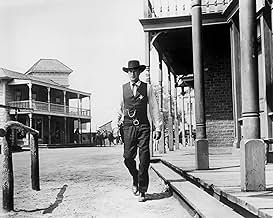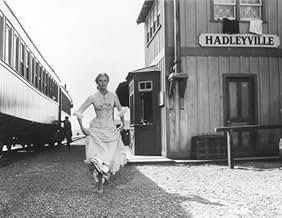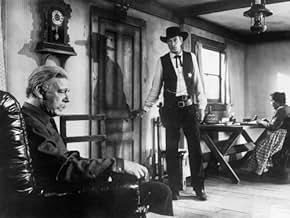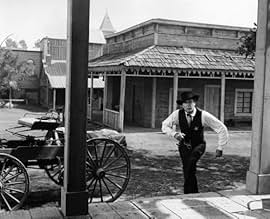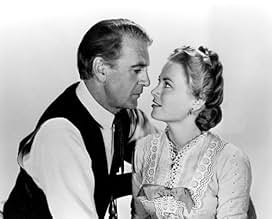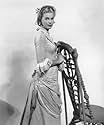Apesar dos desentendimentos com sua namorada e os habitantes da cidade, um marechal deve enfrentar uma gangue quando seu líder chegar no trem do meio-dia.Apesar dos desentendimentos com sua namorada e os habitantes da cidade, um marechal deve enfrentar uma gangue quando seu líder chegar no trem do meio-dia.Apesar dos desentendimentos com sua namorada e os habitantes da cidade, um marechal deve enfrentar uma gangue quando seu líder chegar no trem do meio-dia.
- Direção
- Roteiristas
- Artistas
- Ganhou 4 Oscars
- 18 vitórias e 12 indicações no total
Lon Chaney Jr.
- Martin Howe
- (as Lon Chaney)
Harry Morgan
- Sam Fuller
- (as Henry Morgan)
Robert J. Wilke
- Jim Pierce
- (as Robert Wilke)
Ernest Baldwin
- Townsman
- (não creditado)
Benjie Bancroft
- Church Member
- (não creditado)
- Direção
- Roteiristas
- Elenco e equipe completos
- Produção, bilheteria e muito mais no IMDbPro
Avaliações em destaque
John Wayne was totally wrong to call this movie un-American. Courage and cowardice are universal emotions, and the attitudes of the characters in High Noon are, I think, incredibly truthful and telling. I know that if I lived in the Wild West, had a job and family, and was asked to stand up and fight against a gang of gun-toting psychos I would probably not be able to do it. That's why Gary Cooper's Will Kane is such a remarkable character in terms of self-respect, morality and inner strength. It's the way he MUST uphold the law even though it will perhaps cost him his wife and his life. It is the various townfolk with whom most of us will identify, even if it makes us feel shame or unworthiness to admit it. No matter how bravely we act, nor how much we want to think heroically of ourselves, 90% of us would cower in the shadows when the time came to do what Will Kane does in this movie.
On his wedding day, dependable lawman Will Kane (Gary Cooper) has just handed in his badge and is preparing to leave town with his bride Amy (Grace Kelly) when he receives devastating news. An old adversary, Frank Miller (Ian MacDonald), has been pardoned for crimes that he should have hanged for and is on his way to Kane's town of Hadleyville to get revenge. He is due on the noon train, leaving Kane one hour to either run for his life or make preparations to fight. Kane and Amy set off at full gallop, hoping to put some miles between themselves and danger, but Kane doesn't get far before he feels compelled to turn back. With the new sheriff not due for a day, he just can't let go of the extraordinary sense of duty and responsibility he feels towards his town. However when he gets back to town he gets quite a shock - for no-one has the guts (nor, in some instances, the inclination) to fight alongside him against the Miller gang. As time ticks unstoppably towards noon, Kane gradually realises that if he's going to stop Miller and his boys, he's going to have to do it alone!
Cooper's performance is extremely powerful and he received a thoroughly deserved Oscar for it. Kelly is good as his bride, although many viewers will find her character hard to like. Lloyd Bridges has a brilliant early role as Kane's deputy, while the very best of the supporting pack is Katy Jurado as a Latino woman whose "history" with most of the men in town puts her in an unenviable position when the shooting starts. Fred Zinnemann directs the film outstandingly, making each scene fit into the grander scheme of things with literate precision. Any aspiring young film-maker wanting to learn how to pace a film correctly should watch High Noon with a close eye, for it is unparallelled as the most perfectly paced film of all-time. The music by Dmitri Tomkin - plus that incredible ballad "Do Not Forsake Me Oh My Darling" by Tex Ritter - is just one more element that makes High Noon one of the great masterpieces. There's nothing else to say - if you haven't already, go out and see this film NOW!
On his wedding day, dependable lawman Will Kane (Gary Cooper) has just handed in his badge and is preparing to leave town with his bride Amy (Grace Kelly) when he receives devastating news. An old adversary, Frank Miller (Ian MacDonald), has been pardoned for crimes that he should have hanged for and is on his way to Kane's town of Hadleyville to get revenge. He is due on the noon train, leaving Kane one hour to either run for his life or make preparations to fight. Kane and Amy set off at full gallop, hoping to put some miles between themselves and danger, but Kane doesn't get far before he feels compelled to turn back. With the new sheriff not due for a day, he just can't let go of the extraordinary sense of duty and responsibility he feels towards his town. However when he gets back to town he gets quite a shock - for no-one has the guts (nor, in some instances, the inclination) to fight alongside him against the Miller gang. As time ticks unstoppably towards noon, Kane gradually realises that if he's going to stop Miller and his boys, he's going to have to do it alone!
Cooper's performance is extremely powerful and he received a thoroughly deserved Oscar for it. Kelly is good as his bride, although many viewers will find her character hard to like. Lloyd Bridges has a brilliant early role as Kane's deputy, while the very best of the supporting pack is Katy Jurado as a Latino woman whose "history" with most of the men in town puts her in an unenviable position when the shooting starts. Fred Zinnemann directs the film outstandingly, making each scene fit into the grander scheme of things with literate precision. Any aspiring young film-maker wanting to learn how to pace a film correctly should watch High Noon with a close eye, for it is unparallelled as the most perfectly paced film of all-time. The music by Dmitri Tomkin - plus that incredible ballad "Do Not Forsake Me Oh My Darling" by Tex Ritter - is just one more element that makes High Noon one of the great masterpieces. There's nothing else to say - if you haven't already, go out and see this film NOW!
Will Kane (Gary Cooper), the longtime marshal of Hadleyville, New Mexico Territory, has just married pacifist Quaker Amy (Grace Kelly) and turned in his badge. Suddenly, the town learns that Frank Miller (Ian MacDonald) -- a criminal Kane brought to justice -- is due to arrive on the noon train. The townspeople refuse to back the sheriff up.
Apparently, this film was intended as an allegory in Hollywood for the failure of Hollywood people to stand up to the House Un-American Activities Committee during the Sen. Joseph McCarthy Red-baiting era. John Wayne actually called the film "un-American", and was still trashing it twenty years later, which is pretty much the highest honor you can receive.
It must have also bothered Howard Hawks, because the "chicken" sheriff led Hawks to make "Rio Bravo", which, surprise, had John Wayne. As an interesting side note, Cooper was conservative, too, but I guess not as much as Wayne or at least not as emotional about it.
The film is called "a western for people who don't like westerns". I can see the point on that, but I do not know how accurate it is. I liked it, and I do not normally like westerns, so I probably should not argue. But I think some westerns are enjoyable by non-western fans, such as "Unforgiven". So "High Noon" is certainly not alone.
I love that the film is in "real time", that its running time is the same length as the actual plot. The only way this could have been better would be to do it with one, continuous shot. However, I suspect they did not have the technology for this, and it would ruin the cinematography. (Hitchkock basically did this with "Rope" with some key edits, but it is much easier when the film happens in a single room.)
Oh, and there is Lloyd Bridges, so young here...
Apparently, this film was intended as an allegory in Hollywood for the failure of Hollywood people to stand up to the House Un-American Activities Committee during the Sen. Joseph McCarthy Red-baiting era. John Wayne actually called the film "un-American", and was still trashing it twenty years later, which is pretty much the highest honor you can receive.
It must have also bothered Howard Hawks, because the "chicken" sheriff led Hawks to make "Rio Bravo", which, surprise, had John Wayne. As an interesting side note, Cooper was conservative, too, but I guess not as much as Wayne or at least not as emotional about it.
The film is called "a western for people who don't like westerns". I can see the point on that, but I do not know how accurate it is. I liked it, and I do not normally like westerns, so I probably should not argue. But I think some westerns are enjoyable by non-western fans, such as "Unforgiven". So "High Noon" is certainly not alone.
I love that the film is in "real time", that its running time is the same length as the actual plot. The only way this could have been better would be to do it with one, continuous shot. However, I suspect they did not have the technology for this, and it would ruin the cinematography. (Hitchkock basically did this with "Rope" with some key edits, but it is much easier when the film happens in a single room.)
Oh, and there is Lloyd Bridges, so young here...
10didi-5
Gary Cooper's greatest role, at 50, as the newly-married sheriff, Will Kane, left to fend for himself against his returning enemies, abandoned by the town he remains loyal to, and played out in real time through its 90 minute running time.
Ably supported by Grace Kelly as his pacifist Quaker wife, who discovers love and right triumphs over long-held preconceptions; Katy Jurado as Kane's former mistress, a fiery Latino type; and Lloyd Bridges as the feisty deputy; Cooper runs away with the acting honours. The theme tune by Tex Ritter is also worthy of note.
High Noon' works because of its tightly written script, its cracking pace and crackling tension. I've seen the film many times and always see something different to notice and admire; still, I'd love to see it again for the first time and not know the twists and turns, not know how it ends. A fabulous film one of the best.
Ably supported by Grace Kelly as his pacifist Quaker wife, who discovers love and right triumphs over long-held preconceptions; Katy Jurado as Kane's former mistress, a fiery Latino type; and Lloyd Bridges as the feisty deputy; Cooper runs away with the acting honours. The theme tune by Tex Ritter is also worthy of note.
High Noon' works because of its tightly written script, its cracking pace and crackling tension. I've seen the film many times and always see something different to notice and admire; still, I'd love to see it again for the first time and not know the twists and turns, not know how it ends. A fabulous film one of the best.
High Noon is one of the most loved films of all times thanks to the elements that came together to make it the classic that it is. The movie owes a lot to Fred Zinnemann for his tight account of this story by Carl Foreman. The film benefits from Dimitri Tiomkin's great score and the great cinematography by Floyd Crosby.
This is a film that packs a lot of symbolism because of the times when it was done. Those were the days of the communist hysteria where many people in the industry were accused, tried and lost jobs because when they faced the HUAC and Senator Joseph McCarthy.
Gary Cooper plays a man who is decent enough to return to the town where he just has gotten married and has finished his tour of duty. His conscience doesn't let him leave his post as he delays his plans and goes back to defend the town from the bandit who's been freed by Northern judges, and is coming back to seek revenge from Marshal Kane and the town.
Gary Cooper embodied the all Amercian hero. He was an actor who could do no wrong, as he proves in his take of Marshal Kane. We see him as the clock is ticking away toward noon time when the train will arrive in Hadleyville. We see him perspire as he goes around trying to get people help him deal with the problem, to no avail; he will have to do it himself. In the process, he clearly disappoints his new bride, who is horrified at the prospect of losing the man she clearly loves.
Grace Kelly was such an elegant figure that it's hard to imagine she would be in Hadleyville at all! Katy Jurado was also excellent as the jaded Helen Ramirez, the woman who owned a lot of businesses in town. Also effective, Thomas Mitchell, as the mayor of the town and Lloyd Bridges, as Harvey.
This is a film to treasure.
This is a film that packs a lot of symbolism because of the times when it was done. Those were the days of the communist hysteria where many people in the industry were accused, tried and lost jobs because when they faced the HUAC and Senator Joseph McCarthy.
Gary Cooper plays a man who is decent enough to return to the town where he just has gotten married and has finished his tour of duty. His conscience doesn't let him leave his post as he delays his plans and goes back to defend the town from the bandit who's been freed by Northern judges, and is coming back to seek revenge from Marshal Kane and the town.
Gary Cooper embodied the all Amercian hero. He was an actor who could do no wrong, as he proves in his take of Marshal Kane. We see him as the clock is ticking away toward noon time when the train will arrive in Hadleyville. We see him perspire as he goes around trying to get people help him deal with the problem, to no avail; he will have to do it himself. In the process, he clearly disappoints his new bride, who is horrified at the prospect of losing the man she clearly loves.
Grace Kelly was such an elegant figure that it's hard to imagine she would be in Hadleyville at all! Katy Jurado was also excellent as the jaded Helen Ramirez, the woman who owned a lot of businesses in town. Also effective, Thomas Mitchell, as the mayor of the town and Lloyd Bridges, as Harvey.
This is a film to treasure.
For me, Will Kane embodies the American ideal of a hero: a man who stands up for what is right, even when nobody else does, even when the temptation is strong to stick the head in the sand.
Will Kane explains his outlook at the outset: there is no point in running away if that means spending the rest of your life watching your back. His best chance is to face his enemies on his home ground. At this point, he still thinks that honest folk will stand by him. The rest of the movie is a study in character: will he stand his ground when his entire world crumbles around him?
It is puzzling that Howard Hawks, John Wayne, and others thought of High Noon as un-American. I am not sure if this is because of the allegory of the McCarthy era; or the people of an American town collectively sticking their heads in the sand; or the Marshal throwing his badge to the ground in the last scene.
Clearly, the movie does not criticize McCarthyism itself. (It has nothing to say about communism, either.) It appears to criticize the people who did not stand up to McCarthy and the HUAAC, but it can equally well be seen as a comment on the appeasers who did not stand up to fascism or communism.
In any case, not too much must be made of the anti-appeasement angle, because the townsfolk is not the primary focus of the movie: the focus is on Will Kane. When the townsfolk behave like cowards, that gives Will Kane a chance to prove that he is a hero. If the town had stood by the Marshal, we would have seen, at best, an excellent Western like Rio Bravo, but not a masterpiece like High Noon. For Will Kane to be a hero, it is necessary that he stands alone.
No statement can convey the dramatic impact of Will Kane throwing his badge away, but it is worth discussing what this gesture means. For me, it means that the town and the badge were not worth fighting for. Will Kane fought for principle: he fought because he does not run away.
Will Kane explains his outlook at the outset: there is no point in running away if that means spending the rest of your life watching your back. His best chance is to face his enemies on his home ground. At this point, he still thinks that honest folk will stand by him. The rest of the movie is a study in character: will he stand his ground when his entire world crumbles around him?
It is puzzling that Howard Hawks, John Wayne, and others thought of High Noon as un-American. I am not sure if this is because of the allegory of the McCarthy era; or the people of an American town collectively sticking their heads in the sand; or the Marshal throwing his badge to the ground in the last scene.
Clearly, the movie does not criticize McCarthyism itself. (It has nothing to say about communism, either.) It appears to criticize the people who did not stand up to McCarthy and the HUAAC, but it can equally well be seen as a comment on the appeasers who did not stand up to fascism or communism.
In any case, not too much must be made of the anti-appeasement angle, because the townsfolk is not the primary focus of the movie: the focus is on Will Kane. When the townsfolk behave like cowards, that gives Will Kane a chance to prove that he is a hero. If the town had stood by the Marshal, we would have seen, at best, an excellent Western like Rio Bravo, but not a masterpiece like High Noon. For Will Kane to be a hero, it is necessary that he stands alone.
No statement can convey the dramatic impact of Will Kane throwing his badge away, but it is worth discussing what this gesture means. For me, it means that the town and the badge were not worth fighting for. Will Kane fought for principle: he fought because he does not run away.
Você sabia?
- CuriosidadesIn 1951, after 25 years in show business, Gary Cooper's professional reputation was in decline, and he was dropped from the "Motion Picture Herald's" list of the top-ten box-office performers. In the following year, he made a big comeback, at the age of 51, with this film.
- Erros de gravaçãoIn a number of scenes there are Pabst Brewing signs seen on the inside and outside walls of the saloon. Although Pabst did brew in 1848, it did so under the name Best and Company and did not change to Pabst until 1889; the 37-star flag suggests the setting dates are between 1867-77.
- Citações
Helen Ramírez: You're a good-looking boy: you've big, broad shoulders. But he's a man. And it takes more than big, broad shoulders to make a man.
- ConexõesEdited into Darkness at High Noon: The Carl Foreman Documents (2002)
- Trilhas sonorasHigh Noon (Do Not Forsake Me, Oh My Darlin')
Music by Dimitri Tiomkin
Lyrics by Ned Washington
Performed by Tex Ritter
[Played over the opening title card and credits; excerpts played throughout the movie]
Principais escolhas
Faça login para avaliar e ver a lista de recomendações personalizadas
Detalhes
- Data de lançamento
- País de origem
- Idiomas
- Também conhecido como
- A la hora señalada
- Locações de filme
- Empresa de produção
- Consulte mais créditos da empresa na IMDbPro
Bilheteria
- Orçamento
- US$ 730.000 (estimativa)
- Faturamento bruto mundial
- US$ 217
- Tempo de duração
- 1 h 25 min(85 min)
- Cor
- Proporção
- 1.37 : 1
Contribua para esta página
Sugerir uma alteração ou adicionar conteúdo ausente




